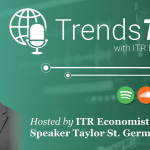WEEKLY FED WATCH
This week on Fed Watch, Consulting Principal and Chief Economist Brian Beaulieu returns to discuss the upcoming Federal Reserve Board meeting and expected interest rate cuts. How might a potential stock market correction influence the Fed’s rate decision? Tune in to find out!
Key Episode Takeaways
- 0:10 – Brian Beaulieu returns to Fed Watch
- 0:28 – Mixed signals from leading economic indicators and the upcoming Fed decision
- 1:34 – Stock market concerns and potential correction
- 2:03 – Examples of how economic data can be misinterpreted
- 2:51 – We expect the Fed to provide some interest rate relief
The below transcript is a literal translation of the podcast audio that has been machine generated by Notta.
Hello. Welcome to September 6th edition of Fed Watch. I’m Brian Beaulieu, back from vacation and bringing you the updates. It’s really interesting what’s going on out there right now. You know, you take a month’s vacation and things seem to start to waver.
It’s pretty clear the Fed is moving towards some sort of rate decline. There’s even folks talking about whether it’s going to be 50 basis points or not. It doesn’t matter really whether it’s 25 or 50, at least they’re breaking the ice, and that is good news.
It’s interesting. The leading indicators, and I’m writing the entire Executive Summary around this concept, and that’ll be out next week, is the leading indicators are not clear right now. Some of them are actually weakening, and that’s going to help the Federal Reserve in terms of making a decision. But some folks have gotten wrong, though, is this whole thing that the jobs reports being weak will make the decision easier for the Federal Reserve. I don’t believe that. They’re economists. They know that jobs lags the economy. It doesn’t tell you what’s going to be. It tells you what was. And if you read the executive summary, you’ll find out that the jobs numbers weren’t even weak by historical standards. So that’s pretty much a lot about nothing.
We have concerns about the stock market, and I don’t know when that concern is going to come to fruition, if it comes to fruition. But we could be looking at a decline of 14% to 17% correction, short-term decline in the stock market. And if that would happen, that’d certainly give the Fed more credence in terms of not just the September decline, but another decline before this year is out, and probably another one in 2025.
The news, including the leading indicators, is really not as bad as some people make it out to be. On the surface, it can look bad, but when you dig deeper down, it isn’t all that bad. For instance, automobile retail sales. For the last three months, they came in just 0.3% of where they were this time last year. But this time last year, they were quite strong. When we look at the seasonal decline going on this year in the three-month moving total, it’s actually at the upper side of the normal range of behavior at minus 1.3%. So 0.3% year-over-year comp isn’t great. It looks scary. But when you break it down, you can understand the numbers a little bit more. And that’s why I don’t think we’re going to see significant decline in these interest rates, but we will see some.
So expect some choppy waters out of the stock market in the month’s quarters ahead that could give the Fed more credence just to recap. The jobs numbers are a worrisome part of our scenario, and we’re looking at manufacturing new orders and manufacturing production actually beginning to look better. All in all, not a crisis event, but we’ll get some interest rate relief anyways. Grab those interest rates when we think we’re at the low or when you think we’re at the low in those interest rates. It’s not going to be a normal duration or a normal magnitude of decline, but it is still, you know, you get 75 bips difference on the cost of money. That can make a big difference in your return on investment. So we’ll keep an eye on that with you. I will see you next week for the next edition of Fed Watch. Thank you.

